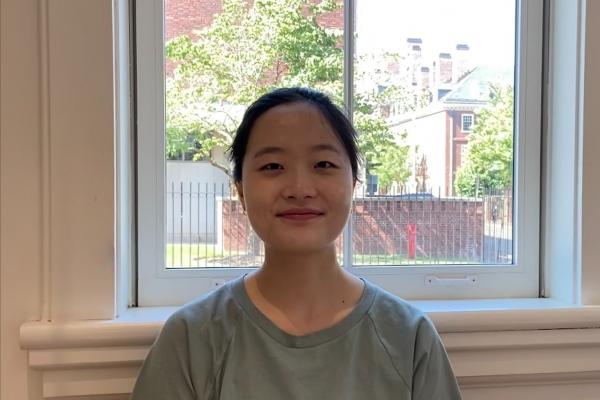
Iris Kang, 2023 recipient of FPG's Barbara Davis Goldman Award
Growing up in Chandler, Arizona, Iris Kang BA ’23 saw firsthand the impact that socioeconomic status and family support have on students’ ability to learn at school. Her understanding that much of a child’s future is determined by their early years piqued her interest in child development. During the last two years of her undergraduate career at the University of North Carolina at Chapel Hill, where she majored in psychology, Kang volunteered as a research assistant in the UNC Brain and Early Experience (BEE) Lab, under the supervision of BEE Lab co-director Cathi Propper, PhD.
Propper, a faculty fellow at the UNC Frank Porter Graham Child Development Institute (FPG) and associate professor in the School of Nursing at UNC, recently nominated Kang for the 2023 Barbara Davis Goldman Award for Excellence in Undergraduate Research, which she won. The award recognizes an outstanding undergraduate student who has participated in research activities at FPG. Named for Barbara Davis Goldman, PhD, a retired research professor in the Department of Psychology and Neuroscience, the award honors Goldman’s commitment to empowering, mentoring, and teaching Carolina's talented future investigators over her nearly 40-year career. Goldman, who was also a senior research scientist at FPG, offered meaningful research experiences to many of Carolina's undergraduate students by giving students valuable autonomy and creativity as they learned to ask important questions and seek answers.
The BEE Lab explores the connections between living in poverty and brain development in children through age 3, focusing on experiences such as sleep, parent-child relationships, and language exposure that may improve trajectories of cognitive development and executive functioning. Kang handled a range of tasks directly related to data processing and recruitment of participants for the BEE study. This included working with research assistants and families to set up data collection visits in participant homes and the BEE lab. She also helped with coding for sleep variables, data management, and data cleaning.
Kang appreciated the opportunity to engage with the research process, gain skills she could not learn in the classroom, and learn from her mentors about new developments in the early childhood field. She says that her work in the lab has strengthened her ability to communicate with research participants. “Learning how to talk with the people who are making the study possible has been really humbling,” she says. “Seeing the people who are sharing their lives with the research world is rewarding.”
“The research world can seem very daunting to people who look at it from the outside, which is how I felt coming in,” says Kang. “But actually being in the lab setting and getting to know my fellow research assistants and professors, I've really learned to value the bonds that I formed while working with people who I wouldn't have been able to work with as closely in the classroom or elsewhere in the university.”
Using data from the lab, Kang wrote and defended an honors thesis, “Rethinking Language in a Tech World: Exploring Socioeconomic Status, Sleep, & Screen Time in Infant Language Development.” Through her research, she learned that children from lower socioeconomic status spend more time watching screens than children from higher brackets. She notes that previous research has found that children who are exposed to more screen time at a young age have less optimal language outcomes, which ties into educational disparities when they enter school. Her hope is that researchers can learn how to leverage existing screen time patterns to provide better educational support for children from lower-income families.
Kang hopes to work in a lab beginning this fall before applying to law school for Fall 2025. Her psychology major and experiences in the lab have inspired her desire to address some root causes of negative outcomes in the lives of young children as she continues in her career. She is grateful for the Goldman Award, saying that the opportunity to work at FPG and with Propper were rewarding on their own without the extra bonus of being recognized.
“The research world can seem very daunting to people who look at it from the outside, which is how I felt coming in,” she says. “But actually being in the lab setting and getting to know my fellow research assistants and professors, I've really learned to value the bonds that I formed while working with people who I wouldn't have been able to work with as closely in the classroom or elsewhere in the university.”
In her nomination statement, Propper lauded Kang, writing that she exemplifies everything students should strive to be, from her interest in and dedication to the topic of her thesis, to her graduate-level writing, to her commitment to the work on the study team over the past two years. Propper added, “Iris has made an exceptional contribution to her work and to research more broadly...It has been an honor to work closely with her over the past year, and I can’t wait to see where she takes her passion and commitment next.”
Previous Award Winners
Read articles about our previous award winners:
2022 | Hannah Spitzer receives FPG's Barbara Davis Goldman Award for Excellence in Undergraduate Research
2020 | Student Researcher Anna Morgan Receives FPG's First Ever Barbara Davis Goldman Award
